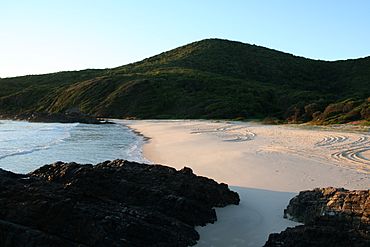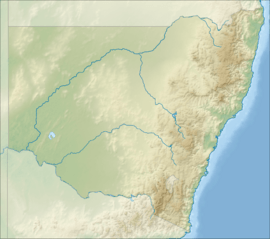Mid North Coast facts for kids
Quick facts for kids Mid North CoastNew South Wales |
|||||||||||||||
|---|---|---|---|---|---|---|---|---|---|---|---|---|---|---|---|

McBrides Beach, Forster, New South Wales
|
|||||||||||||||
| Population | 308,372 (30 June 2016) | ||||||||||||||
| • Density | 14.4187/km2 (37.344/sq mi) | ||||||||||||||
| Area | 21,387 km2 (8,257.6 sq mi) | ||||||||||||||
| Time zone | AEST (UTC+10) | ||||||||||||||
| • Summer (DST) | AEDT (UTC+11) | ||||||||||||||
| LGA(s) |
|
||||||||||||||
| State electorate(s) |
|
||||||||||||||
| Federal Division(s) | |||||||||||||||
|
|||||||||||||||
The Mid North Coast is a beautiful area in the north-east of New South Wales, Australia. It's about 416 kilometers (258 miles) north of Sydney. This region stretches along the middle part of the state's northern coast. It starts from Port Stephens at Hawks Nest and goes up to Woolgoolga, which is close to Coffs Harbour.
The Mid North Coast is famous for its many beaches and amazing subtropical national parks. You'll also find lots of farms and forests here. Some of the main towns along the coast include Coffs Harbour, Forster, and Port Macquarie. It's a very popular place for holidays, whether you like camping or staying in resorts. People also love surfing, exploring coastal paths, and hiking in the bush. A special place to visit is Bellbrook, a mountain village with a unique history. It's great for day trips or for those who enjoy 4WD adventures and fishing for bass.
As you travel north from Newcastle, you'll discover many towns in the Mid North Coast region. These include Bulahdelah, Forster, Tuncurry, Wingham, and Taree. Further north are Port Macquarie, Kempsey, South West Rocks, Macksville, Nambucca Heads, Bellingen, and Coffs Harbour.
Among these, Taree, Port Macquarie, and Coffs Harbour are the biggest towns for shopping and services. They have large shopping centers, public facilities, and fun attractions. Kempsey and the Forster-Tuncurry area are also important towns for businesses. Smaller towns that are popular with tourists include North Haven, Urunga, Gloucester, Crescent Head, Hawks Nest, Woolgoolga, Old Bar, Lake Cathie, and Pacific Palms.
The Mid North Coast has a subtropical climate, which means it's usually warm and humid. It's well-known for its beautiful waterways, sandy beaches, and the green hinterland (the area behind the coast) filled with forests and farms. The main ways people make a living here are through farming, logging (cutting down trees for wood), and tourism.
Contents
Exploring the Mid North Coast's Population
The Mid North Coast is home to many people. The region is divided into different local government areas. These areas help manage local services and communities.
As of June 30, 2016, the Mid North Coast had a total population of 308,372 people. The population has grown by about 10% over the last ten years, showing that more people are choosing to live here.
Here's a quick look at the population in some of the main local areas:
- Mid Coast Council: This is the largest area by population, with 91,958 people.
- Port Macquarie-Hastings Council: This area has 79,905 residents and has seen good growth.
- Coffs Harbour City Council: Home to 74,641 people, it's one of the most densely populated areas.
- Kempsey Shire Council: This area has 29,454 people.
- Nambucca Shire Council: About 19,521 people live here.
- Bellingen Shire Council: This is the smallest area by population, with 12,893 residents.
Getting Around the Mid North Coast
It's easy to travel around the Mid North Coast thanks to its public transport options.
Bus Services
Many bus companies operate throughout the region. These include Buslines, Busways, Eggins, Ryans, and Sawtell Coaches. They help people get to different towns and areas.
Train Travel
The Mid North Coast has several railway stations. Three different trains serve these stations: the Grafton, the Casino, and the Brisbane XPT trains. Each train travels north and south once a day.
If you're heading north from Sydney Central, the first station you'll reach in the Mid North Coast is Gloucester. After that, you'll find stations at Wingham and Taree. Further north, there are stations at Kendall, Wauchope (which is the station for Port Macquarie), Kempsey, Eungai, Macksville, Nambucca Heads, Urunga, Sawtell, and Coffs Harbour. There isn't a train station directly in Forster–Tuncurry.


